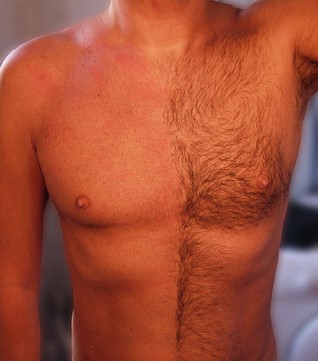As a woman, summer means more than just bike rides and swimming at the lake. It also means deciding whether or not to shave my body hair. In 2014, some declared that “the bush was back,” and in 2015 armpit hair had its moment in the spotlight as women sported photos of their hair on Twitter and Instagram. While the stigma of being a hairy lady does not seem to be waxing, it is certainly far from over.

In the U.S., mass armpit hair removal began only after the introduction of the first women’s body razor in 1915, and shaving pubic hair took off after the bikini was popularized in the late 1940s. Since the 1960s, women’s body hair has come in and out of fashion. For many women in countries like the US and the UK, removal of leg, underarm, and pubic hair is an everyday practice. A recent US survey shows that 84% of women surveyed engaged in some form of pubic hair removal. Women who choose not to shave these areas often face policing from family and friends that reinforces heterosexuality and homophobia. For instance, family and friends promote heteronormativity when they voice concerns over whether potential male partners would find unshaved women attractive.
- Breanne Fahs. 2011. “Dreaded ‘Otherness’: Heteronormative Patrolling of Women’s Body Hair Rebellions,” Gender & Society 25(4):451-472.
- Merran Toerien, Sue Wilkinson, and Precilla Y.L. Choi. 2005. “Body Hair Removal: The “Mundane” Production of Normative Femininity,” Sex Roles 52(5-6): 399-406.
While people often view men’s body hair as more natural than body hair for women, they also express disgust for “gorilla like” male body hair. Many men–both gay and straight–report removing body hair, citing appearance and attractiveness as primary motivations. Media outlets like men’s lifestyle magazines promote body hair removal as a way to increase sexual appeal, appear healthy, and control nature by controlling the body. Thus, for both men and women, constructions of acceptable and unacceptable body hair are closely linked to cultural norms surrounding sexuality.
- Gareth Terry and Virginia Braun. 2016. “‘I Think Gorilla-Like Back Effusions of Hair are Rather a Turn-Off’: ‘Excessive Hair’ and Male Body Hair (Removal) Discourse,” Body Image 17:14-24.
- Elena Frank. 2014. “Groomers and Consumers: The Meaning of Male Body Depilation to a Modern Masculinity Body Project,” Men and Masculinities 17(3):278-298.
- Yolanda Martins, Marika Tiggemann, and Libby Churchett. 2008. “Hair Today, Gone Tomorrow: A Comparison of Body Hair Removal Practices in Gay and Heterosexual Men,” Body Image 5(3):312-316.

Comments 1
Maricruz Gomez — September 20, 2016
Wow. I knew hair removal was huge I just did not know how huge it was. it is true I too have been shaving since I was in middle school and I have tried waxing and I am currently doing laser hair removal. it is true that I feel more feminine with less unwanted hair on my body. I feel that when I have visible hair "where it's not supposed to be" I am looked at with disgust. as if there is something wrong with me.